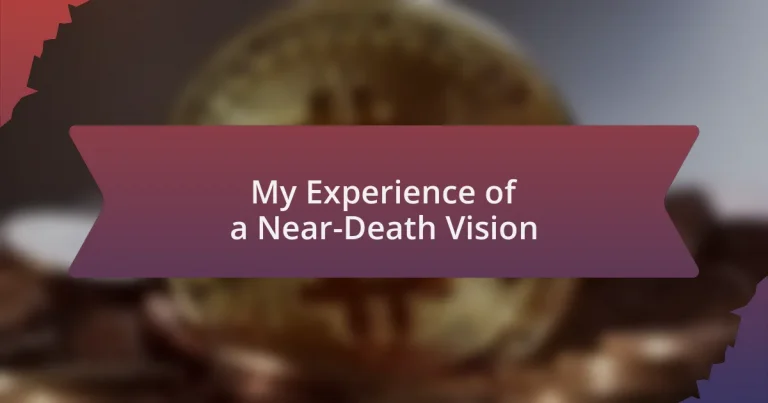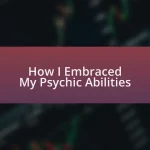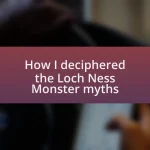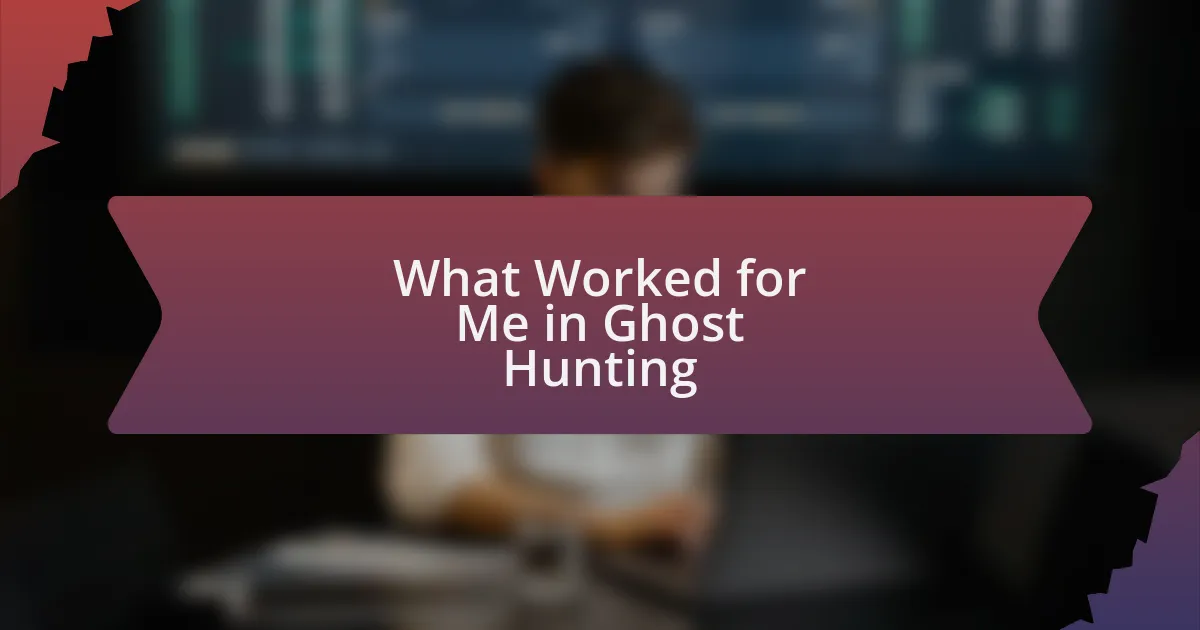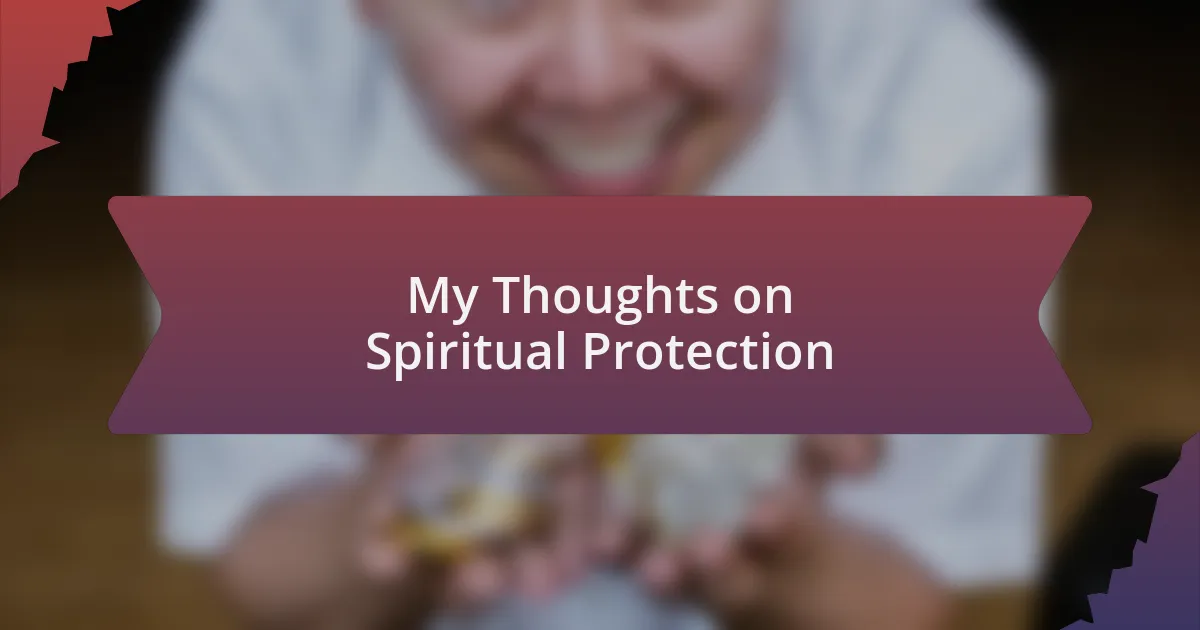Key takeaways:
- Near-death experiences (NDEs) often lead to profound personal transformations, shifting perspectives on life and relationships.
- Encounters during NDEs, such as feelings of interconnectedness and interactions with beings of light, challenge conventional views of consciousness and the afterlife.
- The author emphasizes the importance of cherishing relationships and meaningful connections, inspired by insights gained from their own NDE.
- Post-experience, the author becomes more aware of the impact of thoughts on emotional well-being, advocating for a focus on gratitude and connection over mundane pressures.
Author: Evelyn Hartman
Bio: Evelyn Hartman is a contemporary author known for her evocative storytelling and rich character development. With a background in psychology, she weaves intricate narratives that explore the complexities of human relationships and personal growth. Her debut novel, “Whispers in the Wind,” garnered critical acclaim and established her as a powerful voice in modern literature. Evelyn resides in the Pacific Northwest, where she draws inspiration from the vibrant landscapes and diverse communities around her. When she’s not writing, she enjoys hiking, gardening, and spending time with her two rescue dogs.
Understanding near-death experiences
Near-death experiences, or NDEs, often occur when individuals face life-threatening situations. I remember talking to a friend who described a sensation of floating above their body during an accident. This vivid account makes me wonder, could such experiences connect us to something beyond our physical existence?
Many people report similar elements during NDEs, like seeing a bright light or encountering deceased loved ones. This has led me to ponder, what if these shared themes suggest a universal experience? It’s fascinating how these moments can evoke profound feelings of peace and introspection.
As I explore the emotional weight of NDEs, I can’t help but think about the transformations they often trigger in individuals. After my own brush with death, I found myself reassessing my priorities and relationships. Isn’t it intriguing how these experiences can shift our understanding of life and what lies beyond?
Exploring the paranormal phenomenon
Exploring the paranormal phenomenon is like stepping into a vast and mysterious landscape. There are moments that stretch our understanding of reality, like when I met someone who claimed to have communicated with spirits during their NDE. Listening to their story left me questioning: can our consciousness truly connect with something beyond our realm?
As I delve deeper into the subject, I often think about how these experiences challenge our perceptions of the afterlife. I once read about a person who described meeting a being of light, offering unconditional love and understanding. It made me realize that these encounters could be more than mere hallucinations; perhaps they reveal deeper truths about our existence.
The more I engage with these accounts, the more I’m convinced that we’re only scratching the surface of understanding these experiences. I wonder how many stories remain untold, hidden in the shadows, waiting for someone to bring them into the light. Could these tales be the key to unlocking the mysteries of life and death?
The connection to consciousness
The connection to consciousness often feels like an elusive thread, bridging our physical existence with something far greater. I remember a discussion I had with a researcher who studied near-death experiences (NDEs). She mentioned how many individuals report a profound sense of interconnectedness during these moments, as if their consciousness merges with the universe. It made me wonder—what if our awareness is not limited to our bodies but is part of a larger continuum?
During my own exploration of this topic, I stumbled across an account of a man who, during his NDE, felt every ounce of suffering and joy experienced by others. The emotional weight of that revelation struck me deeply. How can consciousness dive into the depths of empathy beyond physical boundaries? It raises the question: are we truly separate beings, or is there a shared consciousness that we tap into, especially in times of transition?
I often find myself reflecting on how these insights shift my understanding of what it means to be alive. There’s an undeniable power in shared experiences, especially in encounters that challenge our typical views. As I ponder these connections, I ask myself—are these fleeting brushstrokes of profound awareness meant to guide us toward deeper truths about our human experience?
My near-death experience details
In that moment when I hovered between life and death, the world as I knew it faded into an ethereal void. A bright light beckoned me, and I felt an overwhelming sense of peace wash over me. It was as if all my worries were stripped away, leaving only a profound feeling of love and acceptance—a striking contrast to the chaos I had left behind.
As I surrendered to this experience, flashes of my life played out before me, vivid and raw. I relived not just my own memories but felt the essence of others intertwined with my own. I can still hear the laughter of friends and the whispers of loved ones, each resonating in a way that underscored my connection to them. Did I ever truly appreciate those relationships while I was fully present? It prompted me to consider how we often overlook the impact we have on each other’s lives.
One poignant moment stands out: I confronted my fears head-on, reliving a time when I was paralyzed by self-doubt. In that space, I realized those fears were mere illusions, powerless against the radiant truth of who I really am. Did I finally understand that life’s challenges are just stepping stones towards growth? I emerged from that experience with a renewed perspective, forever changed by the recognition that love and courage supersede all else.
Describing my vision’s impact
The impact of my vision reverberates through my daily life in ways I never anticipated. After that transformative experience, I began to view mundane moments—like sharing a smile with a stranger or a simple conversation with a friend—through a new lens. For instance, I remember one afternoon at a café where I noticed the simple joy of laughter mixing with the aroma of fresh coffee. Did I ever realize how profoundly these small interactions could uplift not just me, but those around me?
Embracing this newfound awareness, I found myself drawn to meaningful connections. I recall a moment when I reached out to an old friend with whom I had lost touch. As we caught up, reminiscing and sharing our current struggles, I felt an immense weight lift—a reminder that relationships are a two-way street. Did I have the courage all along to mend bridges? That push from my vision made it clear that nurturing bonds is essential for our collective happiness.
Moreover, I’ve noticed a shift in my priorities since the experience. Instead of succumbing to the pressures of daily life, I’m now more attuned to what truly matters: love, kindness, and compassion. I vividly remember choosing to volunteer at a local shelter instead of spending a day immersed in work. It felt like a calling, fueled by the understanding that every act of kindness has the power to create ripples of positivity. How profoundly do our choices impact the world around us? Since my vision, I’ve learned to cherish these opportunities to contribute and connect.
Insights gained from the experience
The insights I gained from my near-death vision extend beyond mere moments of clarity; they have reshaped my understanding of purpose. I vividly remember sitting alone on a park bench one evening, watching the sun dip below the horizon. It hit me: life isn’t just about existing; it’s about truly living and embracing every experience. How often do we take a sunset for granted, when it holds the potential to inspire reflection and gratitude?
One profound realization was the fragility of time. I often recall a day when I chose to postpone an outing with my family for work commitments. That decision weighed on me for days, serving as a stark reminder of how fleeting these moments can be. When I finally made time for them, I felt an immense sense of joy, as though I was reclaiming lost moments. Isn’t it interesting how we sometimes prioritize work over relationships, forgetting the irreplaceable nature of time with loved ones?
Lastly, I became increasingly aware of the impact of my thoughts on my emotional well-being. After my experience, I would often pause and reflect on my internal dialogue. I recall a particular instance where I caught myself spiraling into negativity over a minor setback at work. Instead of succumbing to that feeling, I consciously redirected my thoughts to gratitude—thinking of everything I had accomplished led me to a place of peace. I still ask myself, how powerful is the mind in shaping our reality? That lens has transformed my approach to challenges and setbacks.
